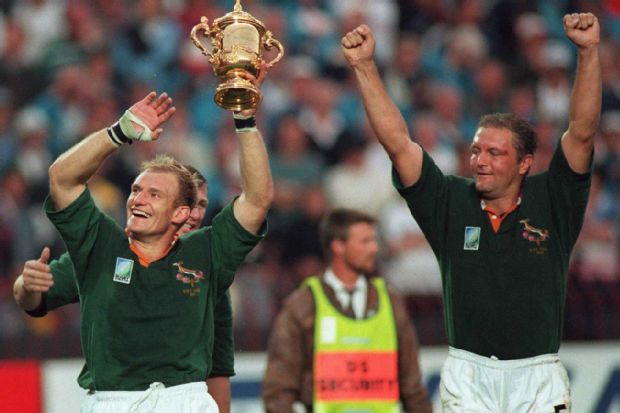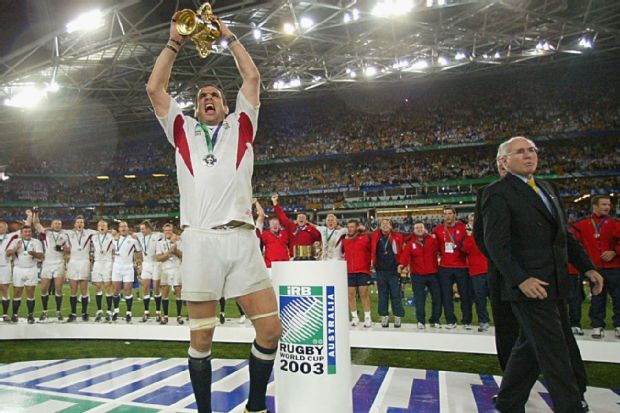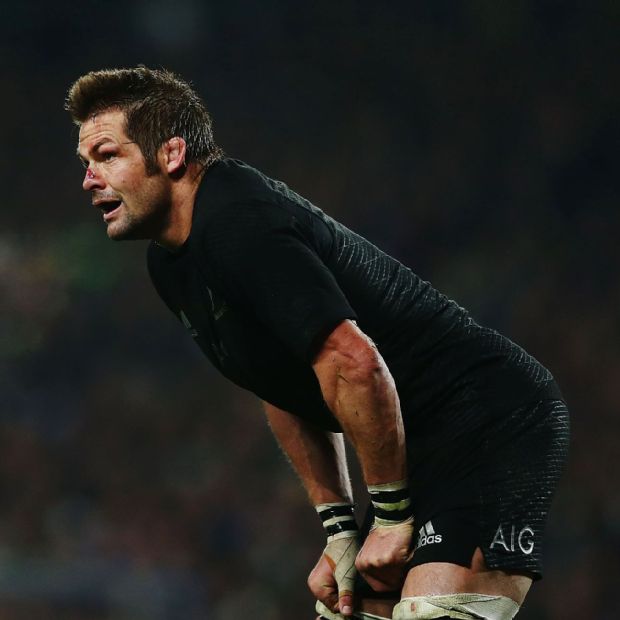Rugby World Cup
World Cup champions will demonstrate thoughtful leadership in big moments
John Mitchell
September 18, 2015
Wobbly England sneak bonus point victory
All seven men to have lifted the coveted Webb Ellis Cup were - and still are, in the case of Richie McCaw - captains of great standing in the game purportedly played in heaven.
David Kirk, who refused to tour South Africa with the New Zealand Cavaliers in 1986 owing to Apartheid, captained the All Blacks at the inaugural World Cup in 1987 because regular skipper Andy Dalton was ruled out prior to the tournament with an injury. Kirk was an intelligent scrum-half and leader of men, and All Black No.843 has since gone on to achieve great success in the corporate world.
Nick Farr-Jones, now 53 years of age, was an outstanding scrum-half with a strong personality to boot. He was influential as a player and captain in the Wallabies' 1991 World Cup-winning campaign.
Francois Pienaar, Hannes Strydom© PHILIP LITTLETON/AFP/Getty Images
Francois Pienaar wasn't an exceptional player, but he was an outstanding skipper at the 1995 World Cup and he earned his respect. With South Africa having emerged as a democracy only one year prior to the competition, Pienaar was the right man at the right time for a country in transition. He understood that a successful tournament would help unite South Africa, which it did.
John Eales, the 1999 World-Cup winning Wallabies captain, was a truly exceptional communicator who could bring people together. As a player, he was a world-class lock who could also kick for goal. Eales played 86 Tests for Australia and retired in 2001 after a distinguished career.
England lock Martin Johnson, who held aloft the 4.5kg trophy in 2003, didn't talk as much as Eales did, but inspired his team through his on-field performances. The former Leicester Tigers player was seen as the quintessential British bulldog - a tough, resilient player who was at the heart of the English forward pack. Johnson impressed me most as a captain during the final against the Wallabies when referee André Watson's decisions were going against England at scrum time. Some English players were visibly perplexed but Johnson remained composed and never allowed it to derail his team.
England captain Martin Johnson lifts the Rugby World Cup© Dave Rogers/Getty Images
Like Pienaar, 2007 World Cup-winning captain John Smit was a good rather than great rugby player but an excellent leader. He was an effective communicator, very diplomatic, and got the best out of both the English- and Afrikaans-speaking players in the Springboks team. Smit knew how to manage strong personalities during his time in the captaincy hot seat, and clearly had relationship strengths.
Meanwhile, McCaw remains an outstanding athlete and character.
In 2011, he was able to deflect the massive external pressure that was a result of the All Blacks' 24-year World Cup title drought and showed great courage by playing with a broken foot. When referee Craig Joubert awarded the hosts a penalty at the end of the World Cup final, all the All Blacks began to celebrate except for McCaw; the captain waited until the ball had been kicked into touch and the final whistle had sounded. For him, the job is never done until it's done. McCaw has since put himself into a position where he can become the first man to lift the Webb Ellis Cup twice. What a fine achievement that would be.
© (Photo by Anthony Au-Yeung/Getty Images)
In my opinion, it's no co-incidence that all seven World Cup-winning captains enjoyed strong relationships with their coaches, and complemented them well: Kirk and Brian Lochore, Farr-Jones and Bob Dwyer, Pienaar and Kitch Christie, Eales and Rod Macqueen, Johnson and Clive Woodward, Smit and Jake White, and McCaw and Graham Henry. That will again prove to be the case in 2015.
The head coach is only as good as the leadership within the team. And it's not just about providing leadership for the first-choice player in each position, but for the second- and third-choice players, too. If you have a weak player leadership group, it doesn't matter how good your management group is; the job probably isn't going to get done. When you see the captain lifting the famous gold trophy on 31 October, keep in mind the leadership group he had around him during the tournament.
I'm of the view leadership is situational. What I mean by that is every player is a leader in some form or another, and not just the players who have the title of captain and vice-captain to their names.
Leadership is the thoughtful application of ability gained through previous experiences whether good or bad, and especially during times of adversity. In sport, an on-field leader doesn't have the luxury to say, "I'll come back to you on that later," he has to make a spur-of-the-moment decision.
A team's main drivers are the Nos.9, 10 and 12, and these days a captain generally doesn't occupy one of those positions. As such, he can make decisions in a stationary moment, for example, whether to go for territory from a penalty or for the points. A captain also has an influential role to play with regards to the referee as far as talking to the match official about decisions, and putting thoughts into his mind for him to consider should that situation reoccur at some stage in the game.
I believe the eighth edition of the Rugby World Cup will prove the most intriguing tournament ever because all the quarterfinalists will boast the ability to win one crunch knockout encounter. The team which ultimately claims the World Cup will win three consecutive knockout fixtures, and will demonstrate the thoughtful application of leadership in the big moments over 240 minutes of rugby.
© ESPN Sports Media Ltd.





